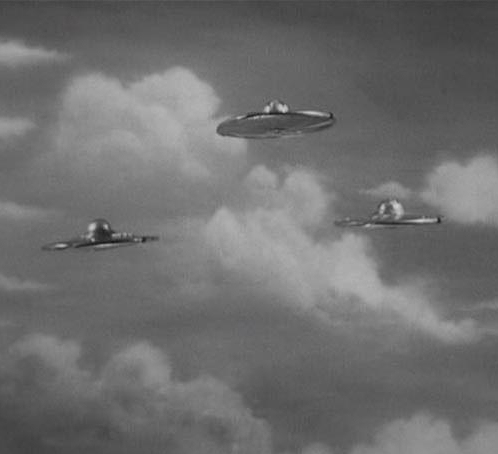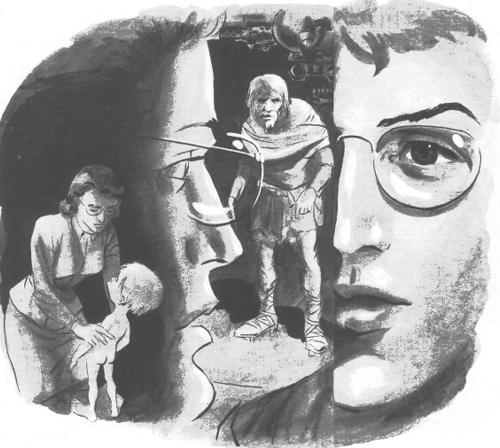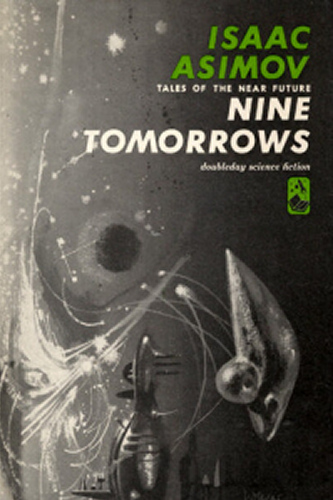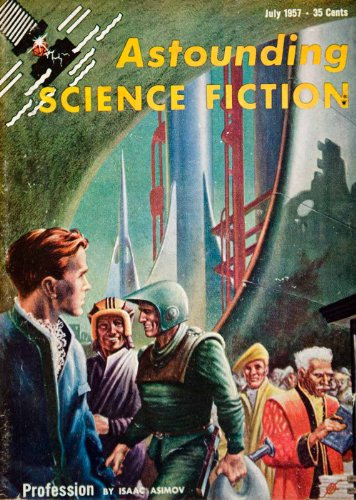And here we are with Part Two of our journey through Isaac Asimov's latest opus, the anthology Nine Tomorrows! One of my readers made the observation recently that if Asimov has a flavor, it's "light vanilla." It's not outstanding, but neither is it objectionable.
I think that's an astute observation (though I really like vanilla, so perhaps it's not fair to that poor, maligned spice). In any event, I've now finished this collection of Asimov's most recent work and shall resume my full report.

The Gentle Vultures came out in the December 1957 issue of Super-Science Stories, one of the few magazines that came out in the second boom of digests stating 1956. Devoted largely to "monster stories" now, it seems to be hanging in there, surprisingly. In Vultures, Hurrian representatives of a galactic federation have been monitoring our planet for the past 15 years, waiting for the inevitable nuclear apocalypse. I say inevitable because in the universe of Vultures, no race, with the exception of the vegetarian and thus non-competitive Hurrians, has managed to harness atomic energy without using it to destroy or nearly destroy itself.
You can argue with the premise or the basic assumptions if you like. I wouldn't, since the point of the story is that humanity sort of turns these assumptions on their head. So now you've got these Hurrians impatiently waiting and wondering whether or not they should, you know, give things a little push…
Skewing the data to fit a premise, indeed!
All the Troubles of the World also came out in Super-Science. Imagine the crime-stopping precogs of Dick's Minority Report are actually a big computer. Now imagine that this computer is sick of predicting crimes (and sicknesses and other species malaises). Now imagine that this is an amazing, groundbreaking story.
Two out of three ain't bad.
Spell my name with an 'S' came out in Star Science Fiction (I've never head of them either). This one came so close to being good as a satire of confirmation bias leading to self-fulfilling prophecy, but the end is a typical and uninspired gotcha. I do enjoy when Asimov writes close to home, culturally, however. He's a lanzmann after all.
I may get flak for this next one. The Last Question is one of Isaac's favorite stories, and my wife liked it a lot when it came out in a 1956 Science Fiction Quarterly. It is a trillion-year history of humanity, the computer that people built, and the universe. The story ends with the universe's heat-death and rebirth. While I admire the scope, the ending doesn't make a lot of sense for several reasons, which I won't detail here for fear of spoiling it, but about which I'd be happy to discuss over coffee and/or beer.

And now for something quite different. I read The Ugly Little Boy when it came out as Lastborn in Galaxy last year. This one may be the best thing Asimov has ever written, and it's a fine swansong to leave on if he's going to wear his non-fiction hat full time. The ugly boy is actually a Neanderthal child plucked from the Pleistocene and held (for sound scientific reasons) as a prisoner in a lab. His only friend is the protagonist, a woman doctor, who essentially adopts him. It's a lovely, touching story whose only fault is that it is too short. Isaac, I didn't know you had it in ye.
So there you have it. Asimov completists should pick up this representative sample of what may someday be known as his "Late Fiction Era." Who knows–maybe if he goes back to fiction in twenty years or so, he'll have learned how to end a story properly.
3.5 out of 5 stars.
(Confused? Click here for an explanation as to what's really going on)
This entry was originally posted at Dreamwidth, where it has comments. Please comment here or there.



